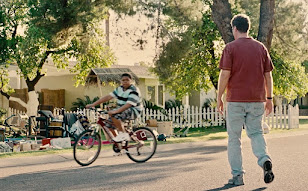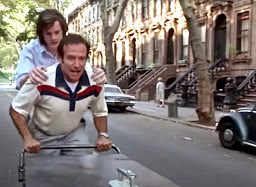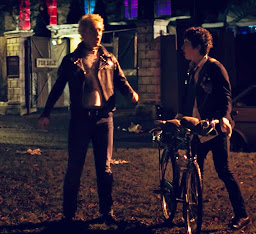Bicycling is trending, diseases boring. Nation’s ridership has risen 12.5% in 2020. Nearly fifty million Americans now commute or recreate by bike, especially in cities, where all are warned by health officials against using sidewalks and subways where safe distances can’t be maintained. Annual bike sales went up between 1.5 and 2.3 times normal until overseas shortages curtailed. But bicycling goes practically unnoticed, ridiculously underserved, and unrecognized intentionally by government agencies during conservative administrations. Venturing outside all you see on shop doors are pandemic protocols. Instills zero confidence. When sports were suspended and workers furloughed due to COVID, about the only things left to do beside aimless spins and household chores were literary projects and movie downloads. Multiple free sources carry many seldom seen titles that could depict bicycling culture, luckily, because economy is too weak for you to spend savings on pay-for-view. Used to be that films, football, or sitcoms relieved you from the daily grind of pleasing bosses and clients. With no job to go to, they keep you from going wacko while trying to replace ways of wrangling subsistence and watching American Dream wither. COVID has been a drain on both consumer savings and federal treasury. Who were its beneficiaries? China produces 80% of bikes sold. You can’t skip a credit card payment or tax bill, but you can trust that only a select few will profit, whose evil ways are more inscrutable and mysterious than even God’s holy writ.
Teen angst drama Growing Op (Michael Melski, dir., 2008) has home schooled bicyclist (Steven Yaffee) rebelling against pot growing dad (Wallace Langham) and mom (Rosanna Arquette) by wanting to attend high school and socialize with kids his own age. Kid sister (Katie Boland) is a street savvy dealer who criticizes his every move. But he’s the only one in family to evade sting by undercover narc girlfriend (Rachel Blanchard) from across street, go to college, and grow up free to run his own grow op. In current economy it’s good to have something to do that generates a livelihood. Government doesn’t give a damn if you die, squirm or starve.
Hyper-creative middle aged author Richard Dunn (Jeff Daniels, Dumb and Dumber) has a supervisory superhero Captain Excellent (Ryan Reynolds, Deadpool, Green Lantern). Under pressure to produce by his surgeon wife Claire (Lisa Kudrow, Friends), this self loathing Paper Man (Kieran and Michele Mulroney, dirs., 2009) decamps to offseason Sag Harbor, Long Island to work on his second novel, but is seriously blocked. Refusing to rent a car, he uses a kid’s Schwinn Sting Ray left in garage to commute back and forth from town, where he somehow connects with seventeen year old Abby (Emma Stone, Zombieland), who, it turns out, also deals with a past tragedy through her own imaginary friend.
Also gone wrong, high school cub reporter Gonzo Gilman (Ezra Miller) gets frustrated working for principal’s lukewarm newsletter and toady editor Gavin Reilly (Jesse McCartney), so starts his own hard hitting exposé, taking after his dad (Campbell Scott), and uncovers academic fraud, administration hypocrisy, cafeteria health violations, classmate beat downs, personal plagiarism, sexual assaults, student extortion, and what most would call criminal conspiracies, which town’s prominent families consider business as usual. They ought to Beware The Gonzo (Bryan Goluboff, dir., 2010). Libeled and threatened as he bikes everywhere, he goes a bit too far, tosses allies under the bus by repeating secrets told in confidence, which unfortunately forfeits his supporters, results in suspension, and risks expulsion. You should expect to be abused and ostracized when you speak for freedom, responsibility or truth. Critics called Gonzo’s devotion to print media an anachronism although backed by capital and collaboration. Online social media is even more of a closed circuit echo chamber: cheap, free, infiltrated by bullies and idiots, and not to be trusted.
Arizona alcoholic salesman Nick Halsey (Will Ferrell) has a bad day, loses his career, missus moves out having left all his stuff on front lawn and locking him out, and vehicle owned by company gets repossessed. When neighbor kid Kenny (Christopher Jordan Wallace) happens by, Nick bribes him with snacks if he’ll watch his stuff while he borrows boy’s bicycle to buy beer and breakfast. Arcadia’s finest come to evict him, but his AA sponsor gets order extended for 3 days. Nick then enlists Kenny to help him with a yard sale in which Everything Must Go (Dan Rush, dir., 2011). Meanwhile, to further humiliate himself because nothing is as humbling as an adult bicycling about, Nick borrows bike again to visit an old flame, who’s now a middle aged single parent.
Timely bit of dark humor, Picture Paris (Brad Hall, dir., 2011) features Hall’s real life wife Julia Louis-Dreyfus as a francophile housewife who’s enchanted by the City of Light. Nest now empty, she moves there temporarily. She’s underwhelmed until a chance encounter helps her find friends and go native. Soon she’s shopping and using Vélib bike sharing to get around. When her husband back home in suburbia wants a divorce to run off with her former best friend, she escapes to Paris permanently, but paté is forever off the menu as she joins crowd to cheer on peloton on Les Champs-Élysées.
This Girl is Bad Ass (Petchtai Wongkamlao, dir., 2011) characterizes bicycle messenger Jukkalan (martial artist JeeJa Yanin, a Thai female comparable to Hong Kong’s Jackie Chan). She plays both sides of competing mobs, skimming on dope deliveries and stashing payments. When one boss gives her cash to complete a drop, he sends out ten henchmen to take it back. In response, she uses her fixie as a weapon to defend and extricate herself. Action comedy is augmented by bike gangs, impressive stunt work, midget boxers, a pervert on a penny-farthing, and ultra-exaggerated characters.
Free wheeling New Orleans ad executive Marley (Kate Hudson) bikes to work, has it all, and plays the field. She begins to feel run down, gets a checkup, and hears bad news: Terminal cancer. While anesthetized, she meets God (Whoopi Goldberg), who offers her 3 boons of her own choice. Learning to fly comes from winning a radio contest. Half a million flows in from a life insurance settlement. Third choice is left unsaid. When health deteriorates, a friend orders her a dwarf escort (Peter Dinklage), who calls himself A Little Bit Of Heaven (Nicole Kassell, dir., 2011), and instead of whoopee counsels her on how to accept death. After a bicycling accident, she meets God again, who advises her to maximize her short time left, which she does with unrealistic gusto for someone with inoperable stage 4 colon tumors. She admits she is in love with Julian (Gael Garcia Bernal), her doctor, which fulfills her third choice of being in a committed relationship for however briefly. What a tearjerker! Why is it someone else beside a healthy bicyclist isn't the one to die?
 Sparrows Dance (Noah Buschel, dir., 2013) has agoraphobic actress Marin Ireland repeating same monotonous routine alone in her New York apartment for over a year, which includes pedaling in place on a stationary bike. Since onset of COVID, most people can relate to such a long term quarantine. When toilet overflows, she’s forced to let in plumber Wes (Paul Sparks) who through gentle kindness helps her expand her self imposed boundaries.
Sparrows Dance (Noah Buschel, dir., 2013) has agoraphobic actress Marin Ireland repeating same monotonous routine alone in her New York apartment for over a year, which includes pedaling in place on a stationary bike. Since onset of COVID, most people can relate to such a long term quarantine. When toilet overflows, she’s forced to let in plumber Wes (Paul Sparks) who through gentle kindness helps her expand her self imposed boundaries.Woodbury pharmacist Doug (Sam Rockwell) and spin instructor Kara (Michelle Monaghan) are unhappily married. Doug lets everyone take advantage of his good nature. Kara emotionally emasculates him and thinks only of winning next bike race. Her contempt pushes him into an affair with pill popping trophy wife Elizabeth (Olivia Wilde), who seduces Doug as part of a plot to kill her husband Jack (Ray Liotta) by giving him an overdose of heart medication, thus secure for herself Better Living Through Chemistry (Geoff Moore & David Posamentier, dirs., 2014). Doug begins to join in, goes from cycling enthusiast to go along bike hater, then uses bike as a domestic weapon. He concocts a potent pick-me-up to outrace wife and put her in her place. Not even Jane Fonda (as herself, another store customer) narrating throughout was able to give this mean spirited DOA a shot in the arm. Truth is, more people die from legal drugs than outlawed narcotics, a humorless reality. Rotten Tomatoes rated it at just 22%. Its $5.5 million budget grossed only $120 thousand. Yet producers can’t resist the compulsion to fund a loser, probably because of some other agenda, like lifestyle persuasion, political statement, or tax write-off.
Foster child Destiny (Yara Shahidi) innocently rides her banana bike around cornfields of Johnson County, Iowa. Placed with supportive parents The Emmets (Alicia Silverstone and Rob Corddry), she gets to compete in a Butter (Jim Field Smith, dir., 2014) carving contest, having been inspired by Bob Pickler (Ty Burrell, Modern Family), an undefeated 15 times champion of this Iowa State Fair event. When organizers ask Bob to step aside, his ambitious wife Laura (Jennifer Garner) figures only a Pickler deserves to win, so enters contest herself. When 10 year old Destiny wins in qualifying round, Laura connives a rematch.
Meanwhile, Bob’s village bicycle paramour Brooke (Olivia Wilde mentioned above), a bisexual tattooed hustler from his favorite strip club, bikes to his home and claims he owes her $1,200. Since Laura holds purse strings, he can’t pay. Brooke rides again to beguile daughter Kaitlan (Ashley Greene) to settle his lap dance debt. Brooke so despises Laura she gives recovered money to Destiny, so she can beat Laura using best knives available. This juxtaposition of ingenuous child and promiscuous adult, each bicycling with her own dignity, is especially heartwarming. Blooper where Brooke bikes across football field, yelling, “Move it, bitches,” at marching band, then crashes is hilarious.
Not quite The 40 Year Old Virgin, Amelia (Christine Weatherup of soap General Hospital) has only ever been touched down there by a bicycle saddle and a private vibrator as she turns 30. Bread and Butter (Liz Manashil, dir., 2015) is more an awkward story than romantic comedy. Fearful of motoring, she pursues a healthier alternative in bicycling. but it likely boosts hormones and makes her hornier. Her life counselor boss tries repeatedly to set her up with doofus Daniel (SNL impressionist Bobby Moynihan), who, though also a virgin, at least has a job. She’s distracted by depressive amateur video artist Leonard (Michah Hauptman), whose days are chronically free. Under parental and peer pressure to get on with living, she makes more bad choices: Learns to drive a Volkswagen Beetle, though it offers a chance for her to meet more suitable mates outside her insular scope. Life will pass you by without a pinch of remorse. It’s up to you to get out and grab hold.
All We Had (Katie Holmes, who directs and stars, 2016) portrays single mother Rita (Holmes), who tows around her 15-year-old daughter Ruthie (Stefania LaVie Owen) as she runs yet again from another messy dalliance. They’re basically broke and homeless, sleeping in their car, tag team shoplifting to survive Bush’s recession in 2008. When they try to sneak off without paying for breakfast, car won't start. Stranded short of Boston destination in a small town, Rita is forced to admit their ruse to diner owner Marty (Richard Kind). Instead of turning them in to police, he offers Rita a job as a waitress and provides them a bunk in back room. Months pass, Rita finds a new suitor, slick real estate agent Vic (Mark Consuelos), who makes it easy for them to buy a house with payments they can’t afford. This bit of stability helps Ruthie get enrolled in high school. The one bright spot in Ruthie’s desperate existence is a teal one speed that she rides all over day and night. But she begins to notice all the businesses closed due to economic downturn. At an AA meeting Rita meets dentist widower Lee (Luke Wilson, Stargirl), who offers to fix her teeth and save their lives.
Not quite The 40 Year Old Virgin, Amelia (Christine Weatherup of soap General Hospital) has only ever been touched down there by a bicycle saddle and a private vibrator as she turns 30. Bread and Butter (Liz Manashil, dir., 2015) is more an awkward story than romantic comedy. Fearful of motoring, she pursues a healthier alternative in bicycling. but it likely boosts hormones and makes her hornier. Her life counselor boss tries repeatedly to set her up with doofus Daniel (SNL impressionist Bobby Moynihan), who, though also a virgin, at least has a job. She’s distracted by depressive amateur video artist Leonard (Michah Hauptman), whose days are chronically free. Under parental and peer pressure to get on with living, she makes more bad choices: Learns to drive a Volkswagen Beetle, though it offers a chance for her to meet more suitable mates outside her insular scope. Life will pass you by without a pinch of remorse. It’s up to you to get out and grab hold.
All We Had (Katie Holmes, who directs and stars, 2016) portrays single mother Rita (Holmes), who tows around her 15-year-old daughter Ruthie (Stefania LaVie Owen) as she runs yet again from another messy dalliance. They’re basically broke and homeless, sleeping in their car, tag team shoplifting to survive Bush’s recession in 2008. When they try to sneak off without paying for breakfast, car won't start. Stranded short of Boston destination in a small town, Rita is forced to admit their ruse to diner owner Marty (Richard Kind). Instead of turning them in to police, he offers Rita a job as a waitress and provides them a bunk in back room. Months pass, Rita finds a new suitor, slick real estate agent Vic (Mark Consuelos), who makes it easy for them to buy a house with payments they can’t afford. This bit of stability helps Ruthie get enrolled in high school. The one bright spot in Ruthie’s desperate existence is a teal one speed that she rides all over day and night. But she begins to notice all the businesses closed due to economic downturn. At an AA meeting Rita meets dentist widower Lee (Luke Wilson, Stargirl), who offers to fix her teeth and save their lives.
Another slice of reevaluating nice living arrives via Lost Cat Corona (Anthony Tarsitano, dir., 2017). When his wife’s pet black cat roams off, Dominic (Karate Kid grown up Ralph Macchio) borrows his sister’s bicycle to scour Corona, Queens, but it turns out to be much more of an adventure than he bargained for. Dangerous situations with criminal neighbors has him facing fears he never realized existed just outside his door, as if mean streets from Martin Scorsese’s childhood (who once in fact resided there), when a few years later it’s an invisible killer that crowns area deadlier than elsewhere among New York’s boroughs, maybe nation as well.
Routine averse man-child Rodney (Steve Olson), about to turn 30, has no job or ambition, only a dysfunctional car and a goldfish in a bowl that he’s too lazy to name. He meets dying widow June (Katherine Cortez) when she catches him squatting in his sedan in front of her home and stealing electricity from her to charge his phone in Fishbowl California (Michael A. MacRae, dir., 2018). They strike a bargain: He’ll tend to her yard for power he stole, but then gradually becomes her live-in assistant and verbal sparring partner. He figures for health she needs to ride her old bike, so restores it. After staging her own “living funeral”, with plans to migrate permanently to Hawaii, she sets him up with convenience store ownership and takes a last fling pedaling that thing. Great to see elderly enjoying spinning along street like a carefree youngling.
Korean star Rain plays champion cyclist Uhm Bok-Dong in full length feature Race to Freedom (Kim Yoo-sung, dir., 2019). Set during the Japanese colonization of Korea prior to WWII, lots of side plots about political assassinations and revolutionary uprisings overwhelm furious racing action. Overlooked cheating and taking out race leader with underhanded tactics typifies times of totalitarian oppression. Though a big budget production, is lumped among South Korea’s worst movie failures returning less than 10% of investment in worldwide distribution. One supposes that a biopic about all but forgotten Bicycle King of Korea needed historical context to bulk up story. A true pioneer was Marshall “Major” Taylor, who broke the sports color barrier a century ago on what was once white only events. Wonder what happened to biopic Major Taylor: Relentless, still listed as “in development”.

























































